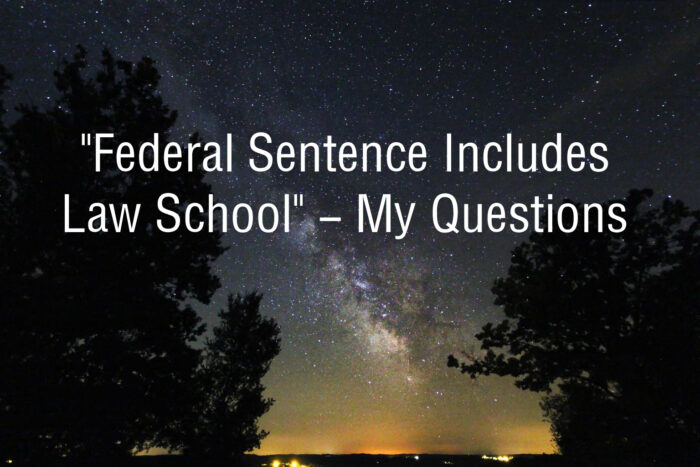
Renewing ourselves involves morning learning from the news like “Rehabilitation through Law School”. As a law student, I’m intrigued by this groundbreaking “Federal Sentence Includes Law School’’ (link below) for a cocaine trafficking case – Ms. Madill was accused of trafficking cocaine in 2018.
I have several questions after reading this unique sentence.
What is the purpose of the sentence?
A probably inappropriate question: would law school become an alternative way to replace prison? Well, at least in the eyes of (US) Southern District of Texas Chief Judge Randy Crane, it is. OR, finishing law study is like a “punishment” 😊 – I will take it as Judge Crane’s humor to invite us to revisit the idea of both prison and law school.
Kidding aside, I believe Judge Crane wants to offer a new option of “rehabilitation”. “Rehabilitation” has its Latin root associated with restoration.
In that article, Professor Berman from Ohio State University Moritz College of Law points out that “rehabilitation should be a goal in sentencing”. In this case, Judge Crane’s sentencing is no conflict with rehabilitation as most of us will agree that law study can be one of many powerful ways to “restore us”. If we become the “fallen angels” or “drifting souls”, we are expected to rise every day to be motivated enough, for instance, reading law books.
But the real question might be this: Must the State deprive one’s liberty through imprisoning for rehabilitation? And this is done in an “enforced” way. In Ms. Madill’s case, sending her to law school as a “supervised release” isn’t depriving her of liberty, at least not completely.
Let me borrow the sentencing purposes listed under Section 5(1) of the Sentencing Act 1991 (Victoria State, Australia) – “just punishment, deterrence, rehabilitation, denunciation, and community protection” (link below). Professor Berman also stresses that “the threat of serious confinement often gets people behaving well”. So the key point is, law school might be a great place for rehabilitation, but it lacks deterrence effect which instills the fear of punishable consequences if we commit offenses repeatedly, unless we say that bar examination is “scary” enough to be a “punishable consequences”. Still, to many of us, losing freedom is the most frightening deterrence. Thus, such sentencing might not be strong enough to protect the community.
Norway’s prison education reduces “recidivism” (the percentage of inmates returning to prison within a few years, check the link below) in addition to creating a more “humanized” prison. However, the prison education doesn’t negate the need for prisons.
It will be valuable to learn from the debate on whether society needs more prisons or more law schools in terms of sentencing, or whether the State should put law schools as the “last resort” prior to sending “fallen angels” to the REAL prison. Eventually, it will come down to a difficult balance between the defendant’s freedom and community protection.
Is rehabilitation through law school unique to women?
Professor Berman has provided another insightful analysis of Ms. Madill’s problem. He addresses that Ms. Madill might have an issue like “the girlfriend problem” which indicates a woman might get involved in drug trafficking to please her boyfriend or husband, therefore the Judge requires her to obtain a law degree “to reduce the likelihood to get involved with the wrong folks”.
If this is the case, any female “fallen angel” needs a book prior to a law degree. The book, “The Second Sex”, written by French Philosopher Simone de Beauvoir, has long been the Bible of feminist groups to advocate the necessity of independent thinking to females. However, if both law degree and Simone de Beauvoir cannot be the savior, we can only blame the universal truth – “love is blind”, or “money is the root of all evil”.
Would male offender receive similar sentencing? I think a guilty mind has no gender difference.
Is this sentencing confined to similar cases?
On page 4 of this unique 2023 sentencing judgment written by Chief Judge Randy Crane, you will find the “special conditions of supervision” stipulating that the defendant “must continue to participate and complete an educational program designed to receive a Doctor of Jurisprudence degree.” (check the link below)
Chief Judge Crane’s unique sentence could set a precedent for other similar cases in the future. According to ABA journal, such a sentence may apply to other occupations.
So the secret role of a Judge can be a headhunter.
Christianity thinks human beings are all “sinners”, but human beings also have hidden talents given by God. Chief Judge Randy Crane could be awarded as the “2023 Best Judge for Innovative Sentence”. It’s inspirational if we compare this US case with the Australian case, He Kaw Teh v. Queen.
Rehabilitation through law school is a warm decision. I’m not going to say “it’s a warm sentence” as a typical sentence is harsh and full of “punishment”. But this decision demonstrates the judicial attempt to understand human nature in a better way. The court has the final say, and the Judge’s discretion impacts on both the offender’s life and the community’s safety. It is certainly worth seeking a novel redemption.
(END)
Links:
Federal sentence includes law school, and attorneys wonder why
Sentencing Judgment: UNITED STATES OF AMERICA v. CHELSEA NICHOLE MADILL
https://www.abajournal.com/files/US_v._Madill_sentencing_judgment_1_.10.23.pdf
Sentencing Principles, Purposes, Factors
https://www.sentencingcouncil.vic.gov.au/about-sentencing/sentencing-principles-purposes-factors
Cruel and unusual: judge sentences defendant to go to law school
https://abovethelaw.com/2023/02/cruel-and-unusual-judge-law-school/
